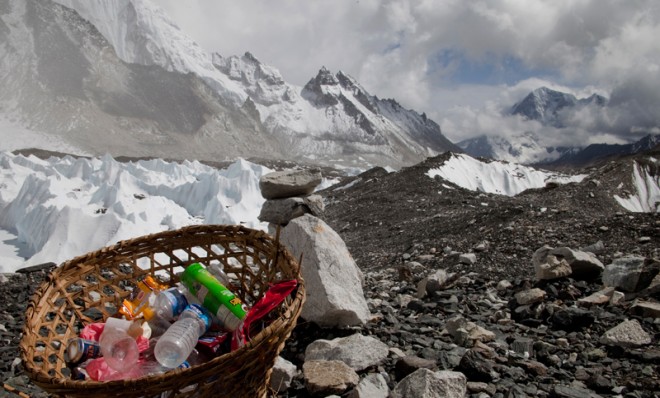Mt. Everest's filthy secret: It's a dump
Exhausted climbers have left behind a trail of debris — and lots of excrement


A free daily email with the biggest news stories of the day – and the best features from TheWeek.com
You are now subscribed
Your newsletter sign-up was successful
The world this week is celebrating the 60th anniversary of the first successful effort to reach the top of the world's highest peak. But environmental activists are using the occasion to call attention to the tons and tons of garbage — and human excrement — that have been left on Mt. Everest's slopes in the decades since Sir Edmund Hillary and his Nepalese Sherpa guide, Tenzing Norgay, made their historic climb. And the picture they are painting isn't pretty.
Here, a look at the mess, by the numbers:
35
The Week
Escape your echo chamber. Get the facts behind the news, plus analysis from multiple perspectives.

Sign up for The Week's Free Newsletters
From our morning news briefing to a weekly Good News Newsletter, get the best of The Week delivered directly to your inbox.
From our morning news briefing to a weekly Good News Newsletter, get the best of The Week delivered directly to your inbox.
Expeditions that try to reach Everest's 29,029-foot peak in a typical year. "There were just people everywhere," one climber, Ayisha Jessa of London, tells the International Business Times.
3,500
Conservative estimate of the number of people who have reached the top in the past 60 years. Everest is no longer "a wilderness experience," says mountaineer Graham Hoyland. "It's a McDonald's experience."
234
A free daily email with the biggest news stories of the day – and the best features from TheWeek.com
Climbers who reached the top of Everest in just one day in 2012.
13
Tons of garbage that the annual Eco Everest Expedition has cleaned up between Everest base camp and the summit since 2008. The refuse littering Everest's slopes includes empty oxygen bottles and torn tents — and lots and lots of human waste. "The two standard routes, the Northeast Ridge and the Southeast Ridge, are not only dangerously crowded but also disgustingly polluted," climber Mark Jenkins writes in National Geographic, "with garbage leaking out of the glaciers and pyramids of human excrement befouling the high camps."
4.4
Tons of garbage picked up this year by a joint Indian-Nepali team, the first of its kind.
2.5
Tons of that garbage classified as "bio-hazardous waste."
1.5
Tons of garbage that was brought down the mountain by climbers and collected by 15 artists from Nepal. They used the haul, which included oxygen cylinders and scraps from a helicopter that crashed into Everest in the 1970s, to make 74 pieces of art. The work is being sold (at prices ranging from $17 to $2,400), and some of the proceeds are going to the Everest Summiteers Association, which collaborated on the project and was the first group to organize an Everest clean-up in 2005.
240
Approximate number of people who have died trying to reach the top. Most of the corpses are still on the mountain, frozen in the "death zone" that starts 26,000 feet up.
4,000
Deposit, in U.S. dollars, that the Nepalese government now requires climbers to pay before heading up the mountain. They risk losing the money if they don't bring down all of their trash.
10
Tons of garbage experts estimate still remains on Everest. "You can't necessarily blame the climbers, especially inexperienced ones, for their littering habit," Jenkins writes in National Geographic. "Even under the best conditions, climbing the tallest mountain in the world is exhausting, dangerous work. Dropping used supplies on the mountain rather than carrying it with them can save vital energy and weight... But the accumulated trash is still steadily ruining one of the most unique places on Earth."
Sources: CNN, National Geographic, History.com, International Business Times, The Hindu, TIME
Harold Maass is a contributing editor at The Week. He has been writing for The Week since the 2001 debut of the U.S. print edition and served as editor of TheWeek.com when it launched in 2008. Harold started his career as a newspaper reporter in South Florida and Haiti. He has previously worked for a variety of news outlets, including The Miami Herald, ABC News and Fox News, and for several years wrote a daily roundup of financial news for The Week and Yahoo Finance.
-
 Political cartoons for February 16
Political cartoons for February 16Cartoons Monday’s political cartoons include President's Day, a valentine from the Epstein files, and more
-
 Regent Hong Kong: a tranquil haven with a prime waterfront spot
Regent Hong Kong: a tranquil haven with a prime waterfront spotThe Week Recommends The trendy hotel recently underwent an extensive two-year revamp
-
 The problem with diagnosing profound autism
The problem with diagnosing profound autismThe Explainer Experts are reconsidering the idea of autism as a spectrum, which could impact diagnoses and policy making for the condition
